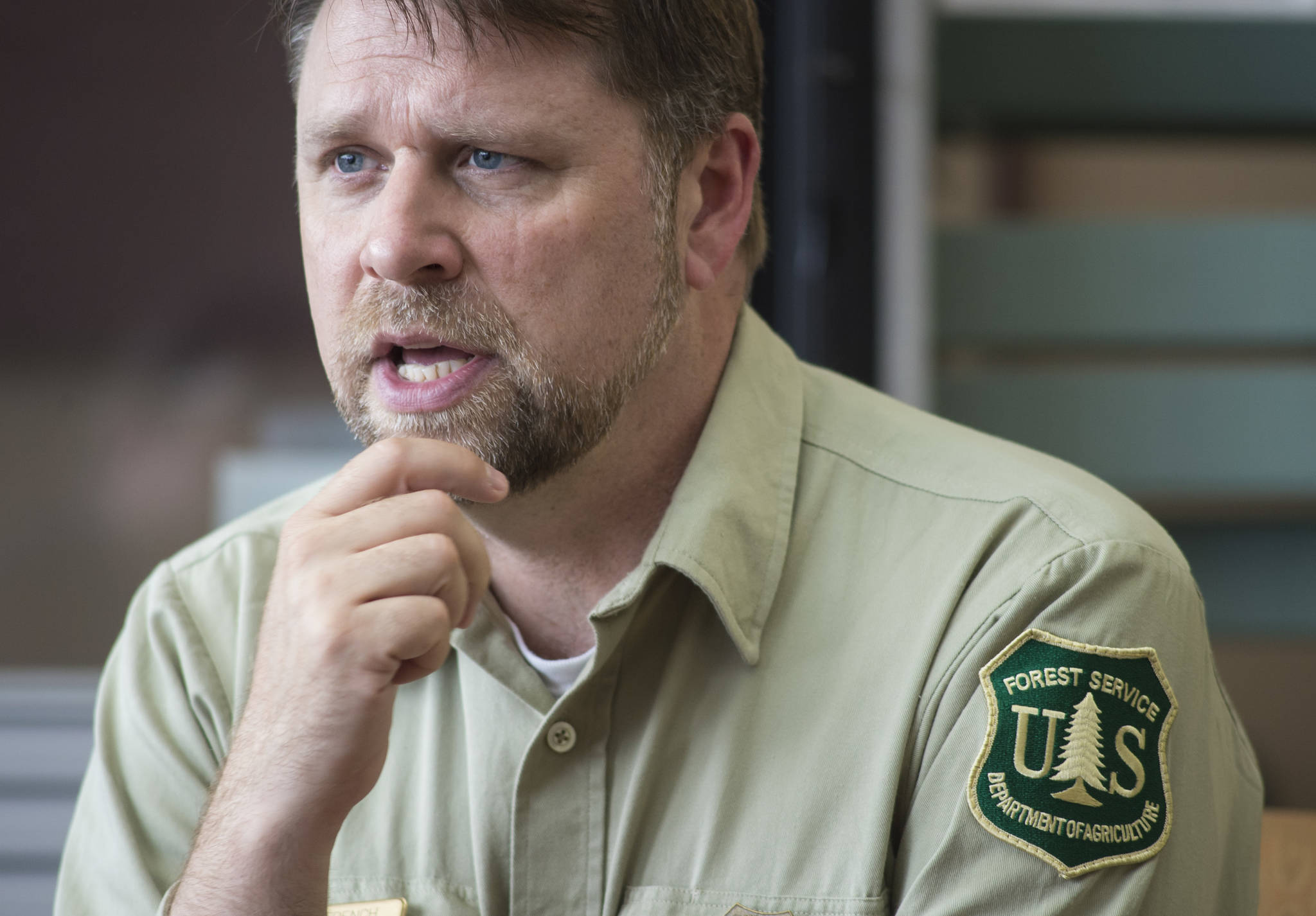The U.S. Forest Service on Thursday announced an agreement with the State of Alaska that may lead to more development in the Tongass National Forest.
State and federal officials told the Empire Thursday morning that they have signed a memorandum of understanding with the intent to create an Alaska-specific “roadless rule” to fulfill the requirements of an embattled 20-year Forest Service program that blocks roadbuilding in most portions of the Tongass. Without roads, hydroelectric dam construction and large-scale mining and logging are generally uneconomic.
Similar state-specific rules have already been enacted in Colorado and Idaho, and Gov. Bill Walker said in his State of the State address earlier this year that he intended to pursue that approach as part of a drive toward state self-sufficiency.
At 17 million acres, the Tongass is the nation’s largest national forest and encompasses most of Southeast Alaska. About 20 percent of that total is Congress-designated wilderness blocked from development even under a modified roadless rule. Another 3.5 million acres is in areas not considered roadless. The remainder is what’s under discussion.
“What we’re asking is what area should be designated with roadless protections in Southeast Alaska,” Chris French, deputy chief of the national forest system, said to the Empire on Thursday morning.
Dave Schmid, the acting regional forester for Alaska, said Thursday’s announcement begins what he expects will be a two-year process of discussion and planning. At the end, the federal government and state will have agreed upon whether or not to open some (or all) of the current roadless area to development.
At its heart, the roadless rule conflict is about differing visions for national forests. On one side are the traditional conservationists, who believe the purpose of a national forest is to allow sustainable public use, either through logging or development. The Forest Service was founded under the U.S. Department of Agriculture for that purpose.
“We think it’s progress,” said Denny DeWitt, director of the First Things First Alaska Foundation. “We thought we had a deal with the feds back in the early 2000s, which has been overruled and set aside, so we think this is a positive step forward.”
On the other side are preservationists who believe the role of national forests has changed since that founding, and they are more valuable and important in their natural state. Those arguments contend the forests should be treated more like parks.
“Removing protections would be a major step backwards for Alaska. It would endanger Southeast Alaska’s billion-dollar fishing industry, while also threatening the abundant wildlife and wild places that are essential to Alaska tourism,” said Andy Moderow, Alaska director of the Alaska Wilderness League, in a prepared statement. The Wilderness League was among several environmental groups that issued press releases following the announcement.
Schmid disagrees that there are only two sides, he said.
“I don’t see that you’re on one side or the other,” he said. “I think the solution is probably somewhere in the middle.”
He and French said that over the next 18-24 months, the federal government (in conjunction with the state) will try to find that middle and in the process end the yearslong debates over the roadless rule by creating a position so well-founded and well-reasoned that it is impervious to legal challenge.
It will not be easy.
The roots of the issue are more than 20 years old. They have their beginning in a 1998 decision by the U.S. Forest Service to draft a transportation policy for national forests across the country.
In the final days of the Clinton administration, the Forest Service published its final rule, which ended logging, roadbuilding and drilling/mining in 58 million acres of national forest land nationwide.
That rule was immediately challenged in court, and in 2003, the Bush administration settled one case brought by the state of Alaska by exempting the Tongass National Forest from the roadless rule. (The exemption was later extended to the Chugach National Forest, too.)
In 2011, the U.S. District Court for Alaska vacated that 2003 agreement and reinstated the roadless rule for the Tongass. The state challenged that ruling in court.
Three years later, three appeals court judges reversed the 2011 decision, and the Tongass was again exempted from the rule.
That decision was appealed to the full Ninth Circuit Court of Appeals, and in 2015, it said the Tongass exemption was illegal. The roadless rule again applied to Southeast Alaska.
The following year, the U.S. Supreme Court declined to hear the state’s appeal, leaving the roadless rule in place across the Tongass.
Despite that deep history, French said the new effort will begin with a “blank, open slate” and will incorporate the comments of a to-be-named public advisory panel as well as the public.
“This is a decision for the Secretary of Agriculture, and we want to make sure that decision is well informed by the folks of Alaska,” French said.
• Contact reporter James Brooks at jbrooks@juneauempire.com or 523-2258.

